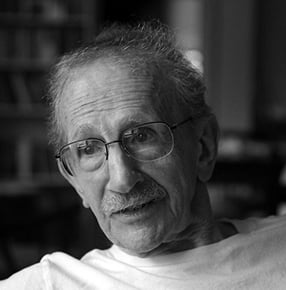The Two
When he gets off work at Packard, they meet outside a diner on Grand Boulevard. He's tired, a bit depressed, and smelling the exhaustion on his own breath, he kisses her carefully on her left cheek. Early April, and the weather has not decided if this is spring, winter, or what. The two gaze upwards at the sky which gives nothing away: the low clouds break here and there and let in tiny slices of a pure blue heaven. The day is like us, she thinks; it hasn't decided what to become. The traffic light at Linwood goes from red to green and the trucks start up, so that when he says, "Would you like to eat?" she hears a jumble of words that mean nothing, though spiced with things she cannot believe, "wooden Jew" and "lucky meat." He's been up late, she thinks, he's tired of the job, perhaps tired of their morning meetings, but when he bows from the waist and holds the door open for her to enter the diner, and the thick odor of bacon frying and new potatoes greets them both, and taking heart she enters to peer through the thick cloud of tobacco smoke to the see if "their booth" is available. F. Scott Fitzgerald wrote that there were no second acts in America, but he knew neither this man nor this woman and no one else like them unless he stayed late at the office to test his famous one liner, "We keep you clean Muscatine," on the woman emptying his waste basket. Fitzgerald never wrote with someone present, except for this woman in a gray uniform whose comings and goings went unnoticed even on those December evenings she worked late while the snow fell silently on the window sills and the new fluorescent lights blinked on and off. Get back to the two, you say. Not who ordered poached eggs, who ordered only toast and coffee, who shared the bacon with the other, but what became of the two when this poem ended, whose arms held whom, who first said "I love you" and truly meant it, and who misunderstood the words, so longed for, and yet still so unexpected, and began suddenly to scream and curse until the waitress asked them both to leave. The Packard plant closed years before I left Detroit, the diner was burned to the ground in '67, two years before my oldest son fled to Sweden to escape the American dream. "And the lovers?" you ask. I wrote nothing about lovers. Take a look. Clouds, trucks, traffic lights, a diner, work, a wooden shoe, East Moline, poached eggs, the perfume of frying bacon, the chaos of language, the spices of spent breath after eight hours of night work. Can you hear all I feared and never dared to write? Why the two are more real than either you or me, why I never returned to keep them in my life, how little I now mean to myself or anyone else, what any of this could mean, where you found the patience to endure these truths and confessions?
Credit
Originally appeared in The New Yorker, 2002. Copyright © 2002 by Philip Levine. Reprinted by permission of the author. All rights reserved.
Date Published
01/01/2002

